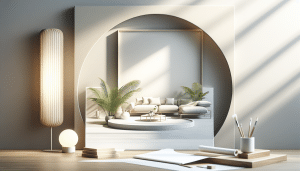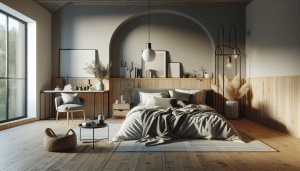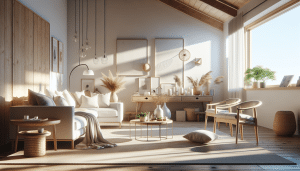You Won’t Believe These Minimalist Lifestyle Secrets
Samantha Lee September 10, 2025
Discover the growing appeal of minimalism and how small, practical changes can bring more balance, peace, and inspiration to everyday living. Explore essentials for decluttering, mindful entertainment choices, and how to create spaces that truly feel like home — no matter your budget.
The Hidden Benefits of Minimalism
Minimalism is more than just owning fewer things; it’s a lifestyle design focused on intentional living and mindful choices. Many people are drawn to this movement because it offers relief from overwhelming clutter, both physical and mental. By decluttering physical spaces, individuals often find that anxiety and decision fatigue decrease. With less to maintain, daily routines simplify, leading to more time and energy for valued experiences. Whether downsizing a wardrobe or reassessing entertainment choices, embracing minimalist values can set the stage for long-term wellbeing and contentment.
One often overlooked reward of minimalism is its positive environmental impact. Consuming less not only reduces waste but also frees up resources that can be redirected toward experiences instead of objects. Choosing quality over quantity plays a crucial role; items that are durable and multifunctional support a sustainable home. Minimalist living can also promote healthier financial habits. By resisting impulsive purchases, it’s possible to cultivate a habit of saving, which opens up possibilities for meaningful entertainment and self-investment activities that enrich everyday life.
Importantly, minimalist lifestyle choices aren’t just about subtraction. They create space for joy and self-discovery. When individuals shed nonessential items, they gain clarity about what truly matters. Minimalism invites careful curation of daily activities — fostering hobbies or entertainment pursuits aligned with personal passions. Over time, this approach can lead to a stronger sense of control, increased happiness, and a more fulfilling relationship with one’s surroundings. Research supports these links between simplicity and psychological wellness (https://www.apa.org/monitor/2016/07-08/ce-corner).
Decluttering Your Space and Mind
Decluttering is central to minimalist living and often begins with a methodical review of physical surroundings. Starting one room at a time provides focus, making the process less overwhelming. Ask simple questions: Does this item serve a clear purpose? Does it contribute to comfort or happiness? Items that fail this test can be repurposed, donated, or recycled. Interestingly, some digital tools can assist with the decluttering journey by organizing to-do lists or tracking progress. This step-by-step approach gradually builds momentum and encourages mindful decision-making skills that extend to other areas of life.
The mental benefits of a decluttered environment have been documented. Clear spaces encourage clear thinking, which is especially significant as daily schedules often feel packed. Reducing visual distractions is linked with enhanced focus and reduced stress, both at home and in workspaces. Mindful entertainment choices complement this philosophy; instead of overloading with content, curating a selection of movies, books, or music that truly inspires provides more pleasure and less overwhelm. This practice builds appreciation for favorite activities while minimizing screen-induced fatigue.
Digital decluttering offers a surprising sense of renewal. Organizing files, unsubscribing from promotional emails, and managing app notifications are small but powerful steps toward a minimalist digital life. Reducing information overload frees up mental bandwidth, allowing for deeper engagement with offline pastimes or nurturing connections with friends and family. As research suggests, intentional digital management helps foster focus, emotional regulation, and even increases creative thinking (https://www.nimh.nih.gov/health/publications/stress).
Mindful Choices for Entertainment
Entertainment does not have to be overwhelming or expensive to be meaningful. Many minimalists focus on enjoying quality time and experiences over the mere consumption of content. Mindful entertainment prioritizes social interaction, creativity, and learning. For example, choosing an evening of board games with family over multiple streaming subscriptions can be more fulfilling and cost-effective. Similarly, attending local art events or free community concerts helps support well-being while curating memorable moments. These entertainment options are more likely to inspire than clutter, aligning with overall minimalist ideals.
Streaming media, music platforms, and podcasts are central to modern leisure, but even these can contribute to digital noise. Assessing which subscriptions and services truly add value can be enlightening. Limiting choices helps prevent decision fatigue, freeing up time for hobbies like reading or crafting. For people seeking fresh alternatives, many libraries and educational platforms offer guided activities, courses, or lending programs for music and films at little or no cost. These options expand horizons without adding to physical or mental clutter.
Embracing mindful habits in entertainment goes beyond what’s consumed; it’s also about how time is spent. Scheduling regular screen-free hours or low-tech weekends encourages socializing, reflection, or outdoor relaxation. Even creative pursuits, such as painting, gardening, or journaling, offer rich entertainment value by engaging the mind and body in satisfying ways. When entertainment aligns with minimalist values, it can nourish and revitalize instead of exhaust and distract (https://www.mayoclinic.org/healthy-lifestyle/stress-management/in-depth/stress-relief/art-20044456).
Designing Cozy and Functional Minimalist Homes
The minimalist approach is often reflected in home design and organization. Creating cozy but simple living areas starts with prioritizing multi-functional furniture, soothing colors, and natural light. Neutral color palettes help establish a sense of calm, while strategically placed decor, such as a single art piece or well-chosen houseplant, brings warmth. The absence of clutter makes it easier to maintain cleanliness and order, reducing daily chores and supporting relaxation. Smart home storage solutions enable even small spaces to feel open and inviting.
Minimalism encourages quality over quantity in home decor choices. Rather than following short-term trends, selecting timeless pieces means each item has a clear purpose and long-lasting appeal. This philosophy extends to entertainment zones; a streamlined media center supports comfortable movie nights or music sessions without visual chaos. By regularly evaluating what is displayed and stored, households maintain practical beauty while effortlessly adapting to changing needs. For renters and homeowners alike, minimalist design makes moving or reorganizing much easier, further reducing life’s friction.
Functional minimalism does not mean austerity. Thoughtful layering with soft textiles, varied textures, or personal mementos adds depth and charm. Open shelving, baskets, and collapsible furniture keep items accessible but unobtrusive. These small choices collectively reinforce the home’s role as a sanctuary — a place to recharge, host friends, or settle in with a favorite book. Surveys show that environments designed with minimalist principles promote better sleep, lower stress, and generally happier moods (https://www.sleepfoundation.org/sleep-hygiene/declutter-your-bedroom).
Building Sustainable Minimalist Habits
Sustaining a minimalist lifestyle requires adopting gradual, supportive habits. Setting small, achievable goals — such as letting go of one unused item weekly or opting for experiences over gifts — creates steady momentum. Making conscious shopping decisions, like researching the origins and longevity of purchases, aligns with environmental stewardship. Many find that establishing routines, such as a monthly digital cleanout or a weekly mindful activity, integrates minimalism into both work and play without feeling restrictive or forced.
Social support plays a vital role in sustaining new habits. Building a minimalism mindset with partners, family, or online communities gives encouragement and idea sharing. Public libraries, city wellness programs, and nonprofit learning hubs often host events or workshops for those interested in simple living. These resources help individuals stay focused on meaningful goals, fostering a cycle of giving, reusing, and smarter entertainment. The result: a lifestyle that balances enjoyment with responsibility, inspired by the strengths of community.
Ultimately, the minimalist journey is personal and flexible. It can be adapted for individuals, couples, or families at any life stage. The keys to success are reflection and incremental progress. Every small adjustment — whether decluttering relationships, daily tasks, or entertainment routines — can add up to significant benefits over time. Experts emphasize that ongoing mindfulness is central, gradually unlocking the benefits of living with less but experiencing more (https://www.psychologytoday.com/us/basics/mindfulness).
Minimalism and Emotional Wellbeing
Embracing a minimalist lifestyle is closely linked to improved emotional health. Letting go of unwanted items, toxic routines, or draining obligations offers a unique kind of freedom. This freedom can reduce feelings of stress and overwhelm, making space for hobbies, relaxation, or creativity. Even in entertainment, narrowing choices to genuinely enjoyable activities increases satisfaction. Minimalism also helps counteract the relentless pressure of comparison, restoring confidence and authenticity to daily living.
Research highlights that less clutter and fewer distractions support faster recovery from emotional lows. Minimalist routines — from early morning quiet time to regular nature walks — foster resilience and optimism. Connections formed through simple pleasures, such as shared meals or group creative projects, nurture belonging without excess or rush. With fewer distractions and lower financial strain, individuals may find it easier to foster patience, gratitude, and a deeper sense of fulfillment in everyday experiences.
Minimalism is not a rigid set of rules but an adaptable toolkit for emotional and practical harmony. As life changes, so too will needs and preferences. Periodic self-reflection helps ensure that minimalism remains aligned with unique goals and relationships. Ultimately, minimalism is a process that celebrates both peace and opportunity, helping people make the most of entertainment, leisure, and daily routines without the weight of excess (https://www.npr.org/sections/health-shots/2019/12/09/786497671/the-minimalists-why-knowing-you-have-enough-is-key).
References
1. American Psychological Association. (2016). Declutter your way to less stress. Retrieved from https://www.apa.org/monitor/2016/07-08/ce-corner
2. National Institute of Mental Health. (n.d.). 5 Things You Should Know About Stress. Retrieved from https://www.nimh.nih.gov/health/publications/stress
3. Mayo Clinic Staff. (n.d.). Stress Relief from Laughter? It’s No Joke. Retrieved from https://www.mayoclinic.org/healthy-lifestyle/stress-management/in-depth/stress-relief/art-20044456
4. Sleep Foundation. (2021). How to Declutter Your Bedroom for Better Sleep. Retrieved from https://www.sleepfoundation.org/sleep-hygiene/declutter-your-bedroom
5. Psychology Today. (n.d.). Mindfulness. Retrieved from https://www.psychologytoday.com/us/basics/mindfulness
6. NPR. (2019). The Minimalists: Why Knowing You Have Enough Is Key. Retrieved from https://www.npr.org/sections/health-shots/2019/12/09/786497671/the-minimalists-why-knowing-you-have-enough-is-key







